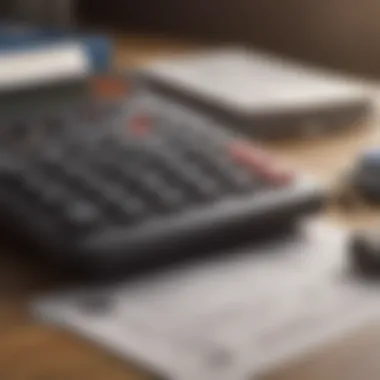Effective Strategies to Pay Off Your Mortgage in 5 Years


Intro
Paying off your mortgage in five years sounds ambitious, doesn’t it? Yet, for many homeowners, this is not only a dream but an achievable goal. It can provide a sense of freedom, lessen financial stress, and enhance personal security. Let’s break down how you can make this lofty aim a reality with some solid, actionable strategies.
Understanding the terrain of mortgage repayment is fundamental. You’ll need to consider various aspects like budgeting, repayment methods, and even some minor lifestyle changes. This isn’t just about throwing a bit of extra money at your mortgage; it’s a well-thought-out plan that requires commitment and diligence.
This guide will give you the tools you need to forge ahead with your mortgage repayment journey. Let’s explore effective strategies tackling everything from budgeting insights to understanding refinancing options and how these can impact not just your finances, but your emotional well-being, too.
Coverage Options
Mortgage coverage can come into play in various forms. Though not entirely about insurance, understanding how to safeguard your payment plan is crucial, especially when unexpected bumps in the road occur.
Types of Coverage Available
- Life Insurance: If the unthinkable happens, having a policy can ensure that your mortgage is paid off. It protects your family from potential financial burdens.
- Mortgage Protection Insurance: This specifically targets mortgage balance cover in case of unforeseen circumstances that might hinder your ability to pay. It can be a bit pricey, but it ensures peace of mind.
- Homeowner's Insurance: While this won't directly impact your mortgage, it's essential for protecting the investment you'll work hard to pay down. Not having adequate coverage could lead to significant financial troubles if damages occur.
Liability Coverage Explained
Liability coverage becomes relevant if someone gets injured on your property or if you inadvertently cause damage to someone else's property. In the context of your home and mortgage, having sufficient liability coverage can prevent unnecessary financial strain that could impede your ability to meet mortgage repayments.
"Investing in the right coverage isn’t just a safety net; it’s an essential part of a sound financial strategy."
Key Considerations
When prioritizing the goal of paying off your home swiftly, certain factors need consistent evaluation.
Factors to Assess When Choosing Insurance
- Coverage Needs: Assess what coverage is essential versus what might be just extra fluff. It’s crucial to balance protection with costs efficiently.
- Cost vs. Benefit: Sometimes, paying for coverage that appears useful doesn’t translate into actual financial security. Always measure risks accordingly.
- Reviews and Ratings: Don’t skimp on research. Look into customer feedback for the companies you’re considering.
Understanding Policy Limits
Knowing how much your insurance will cover is non-negotiable. If your policy has low limits, unforeseen occurrences could lead to significant out-of-pocket expenses. Your goal should be clarity about what each policy entails and how it could primarily affect your repayment capability.
Your journey to homeownership freedom within a five-year timeframe begins here. By understanding both mortgage coverage and aligning it with your repayment strategies, you’re already taking the first steps toward financial mastery.
Understanding the Five-Year Payoff Goal
Paying off a mortgage in five years seems like a Herculean task. Yet, it can be a reality for many homeowners willing to put in the effort. This goal reflects not just financial ambition, but also a desire for peace of mind. After all, eliminating that monthly payment can significantly reduce stress while freeing up funds for other endeavors. Understanding how to navigate this path can be the key that unlocks a new chapter of financial freedom.
The Concept of Mortgage Payoff
Mortgage payoff is pretty straightforward in theory. It’s the process of completely settling the amount owed to the lender for the home you purchased. While most people opt for 15 or 30-year mortgage terms, targeting a five-year payoff requires a shift in how you approach budgeting and spending.
At the core, this isn’t just about cutting down on expenses. It’s an entire redesign of your financial life. Some folks take on a second job, while others pull from savings or invest in short-term gigs to boost income. This goal doesn’t just add urgency to your finances; it forces tough conversations about priorities. Are you really going to splurge on that new car when you could funnel that money into paying off your home?
Benefits of Accelerated Repayment
The benefits to paying off your house quicker are numerous and can be life-changing.
- Interest Savings: The faster you pay down your mortgage, the less interest you'll accrue over time. With less interest, that’s more money in your pocket in the long run.
- Increased Equity: As you pay down your principal faster, your equity in the house grows rapidly. This can empower future financial decisions like investments or even leveraging it for loans.
- Psychological Advantage: The stress relief that comes with owning your home outright can’t be overstated. Many homeowners report feeling an incredible weight lifted off their shoulders once their house is fully paid.
- Flexible Finances: Once you conquer that mortgage, you can redirect those monthly payments toward investments, education, or saving for future goals. It opens up a world of possibilities.
"Owning a home free and clear means you’ve got the world at your feet. No longer chained to a mortgage, you’re free to explore financial opportunities like never before."
Embarking on this payoff journey entails not just practical strategies, but also a mindset transformation. It’s about adjusting your current lifestyle to meet a lofty goal. Understanding the nuances of this process can set you on the path toward financial independence.
Analyzing Your Financial Situation
Understanding your financial landscape is a critical first step when embarking on the journey to pay off your mortgage within five years. This step doesn't just outline your current standing; it also illuminates the path you'll need to tread. The nuances of your finances will guide the strategies you'll consider, reflecting your unique position and readiness to tackle such an ambitious goal. Evaluating your financial situation helps identify areas to optimize, prioritize, and ultimately, pave the way to becoming mortgage-free.
Evaluating Income and Expenses
First and foremost, assessing your income and expenses is akin to taking inventory before a big heist—this intel will shape your entire plan. Start by calculating your total monthly income. This includes not just your salary, but any side gigs, rental income, or investment returns. Once you have that rounded up, turn to your monthly expenses. List them out in a manner that distinctly separates necessary costs like utilities, groceries, and mortgage payments from discretionary spending—think dining out or subscription services.
\
Here's a quick breakdown of how to start:
- List income sources: Job, freelance work, rental income, etc.
- Categorize expenses:
- Fixed expenses (mortgage, utilities)
- Variable expenses (groceries, entertainment)


This exercise sheds light on where your cash flows in and out, allowing for informed decisions. It may even reveal opportunities to tighten the belt, freeing up extra funds to direct toward your mortgage.
Assessing Debt Levels
Next, it’s essential to take a long, hard look at your total debt load beyond the mortgage. You might think paying off your house is the biggest mountain to climb, but don't overlook other obligations. This includes credit card debt, car loans, or student debt. While debt can feel like quicksand, a clear understanding of what's dragging you down enables strategic maneuvers.
Here’s what you should do:
- Calculate total debt: Tally everything you owe.
- Check interest rates: High-interest tells you where to focus first.
- Create a repayment plan: Devise a strategy for reducing debts systematically.
\ This assessment reveals the weight of your burden. If too much burden exists, it might be necessary to cut back on certain expenses or restructure debts to create additional flexibility for tackling the mortgage.
Considering Current Savings
Lastly, let's explore your current savings. It’s one thing to dream big, but turning dreams into reality requires a financial cushion. Assess your emergency funds, retirement savings, or any other liquid assets. This isn't just a safety net; this is potentially a vault of resources you could tap into if needed.
Consider the following:
- Regular savings accounts: Can these be allocated to the home loan?
- Investment accounts: What’s the risk compared to the benefit of liquidating?
- Emergency funds: Ensure you keep a portion intact for emergencies but evaluate if you have excess.
"Money lost can be found; time lost cannot be retrieved."
By understanding your financial situation thoroughly, you set the stage for realistic and actionable plans. This groundwork allows you to align your aspirations with practical strategies, crafting a tailored approach that will ultimately lead to paying off your mortgage early.
Creating a Realistic Budget
Creating a realistic budget is vital for homeowners seeking to cut their mortgage down to size in a brisk five-year timeframe. This budgeting process isn't just about managing finances; it's about crafting a forward-looking plan that prioritizes debt elimination. Without a firm grasp on where every dollar goes, the goal of paying off a home can seem as far-fetched as a rainy day in the desert. A thoughtful budget provides not just clarity but also enables systematic action towards achieving that ambitious goal.
Setting aside extra cash for mortgage payments is not merely an afterthought; it's central to the journey. A realistic budget allows homeowners to figure out how much disposable income can be directed towards their loan every month. When people start to see their bills and expenses laid out, it becomes easier to identify areas where sacrifices can be made. This clear vision can act as a motivational driver, as tracking progress can provide a real sense of achievement.
Setting Priorities
Setting priorities is akin to drawing a map before embarking on a voyage. Homeowners need to rank their spending by necessity and importance. Essentials like groceries, utilities, and transportation should first be covered, but what about luxuries? Dining out and that latte fix can easily take a back seat when there’s a hefty mortgage on the line. By differentiating between needs and wants, a homeowner can shed light on potential resources available for extra mortgage payments. This discipline forms the bedrock of a realistic budget.
Allocating Extra Funds to Mortgage
Identifying Extra Income Sources
When it comes to Identifying Extra Income Sources, the sky’s the limit. Freelancing, starting a side hustle, or even taking on odd jobs can provide an influx of cash that goes straight towards the mortgage. This flexibility allows homeowners to explore their skills and turn hobbies into income streams. A side gig can become a blessing in disguise; many find that through leveraging their talents, they not only earn but also enrich their lives by connecting with others.
However, it
comes with its own unique challenges. Balancing a full-time job with extra work can lead to burnout. Still, if managed well, the benefits generally outweigh the drawbacks. Using this extra cash can become a cornerstone in the strategy to pay off a mortgage quickly, presenting a pathway for financial freedom sooner rather than later.
Utilizing Windfalls Effectively
Windfalls, like tax refunds or unexpected bonuses, can be used to your advantage through Utilizing Windfalls Effectively. Rather than spending these delightful surprises on short-term splurges, funneling this money directly into the mortgage can yield substantial benefits. This approach is a common recommendation for those striving for an aggressive payoff strategy.
The key point here is that this is a unique opportunity; these windfalls often don't occur regularly. However, they provide a lump sum that can significantly reduce the principal amount. While they are sometimes seen as “found money,” using them wisely can mean the difference between simply managing debt and erasing it into oblivion. Nevertheless, one should also consider potential desires and opportunities that might arise with this influx — balancing between paying off debt and enjoying life still matters.
Tracking Spending Habits
Monitoring spending habits might sound mundane, but it plays a huge role in staying on track. Regularly reviewing expenses allows homeowners to recognize patterns and make adjustments where needed. Mobile apps and spreadsheets can assist in making this task less daunting. By keeping a keen eye on where money flows, unexpected leaks can be plugged. For instance, regularly wasting money on subscriptions for services seldom used is akin to throwing good money after bad.
In short, a realistic budget isn’t just a guide; it’s a commitment. It transforms the payoff journey from an unattainable dream into a tangible reality. The essential steps—setting priorities, allocating extra funds, and monitoring spending—all work together to yield the kind of focus and clarity required to achieve the goal of wiping out a mortgage in five years.
"A budget is telling your money where to go instead of wondering where it went."
The combined approach of good budgeting and mindful spending lays the groundwork for a smooth passage on the road to financial freedom.
Repayment Strategies
When considering how to achieve the ambitious goal of paying off your mortgage in just five years, the importance of effective repayment strategies cannot be overstated. Paying off a mortgage early is not just about making more payments; it involves a carefully planned approach to manage funds effectively. The right strategies can lead to significant savings on interest, reduce financial stress, and free you from debt much quicker. This section will delve into choosing the right loan structure, making extra payments, and exploring refinancing options—all pivotal components to help achieve your aggressive goal.
Choosing the Right Loan Structure
A well-structured loan can set the stage for a successful repayment journey. The right loan structure gives you flexibility while ensuring you don’t pay unnecessary excesses in interest.
Fixed vs. Variable Rates
When deciding between fixed and variable interest rates, a fixed-rate mortgage offers stability and predictability. With a fixed rate, your monthly payments remain constant throughout the life of the loan, which is advantageous for budgeting purposes. In this current environment of fluctuating interest rates, securing a fixed-rate mortgage may save you from potential increases later on, thus contributing to a more manageable payment experience.


In contrast, variable-rate mortgages can start relatively low and may become less predictable. That can lead to lower initial payments but potential higher long-term costs. Many homeowners find comfort in knowing exactly how much they are paying, making the fixed option a common choice for those looking to pay off their home quickly.
- Consistency in payments with fixed-rate mortgages means less risk.
- Variable rates may offer lower initial costs but can escalate.
Term Length Considerations
Choosing the length of the loan term significantly impacts your repayment strategy. Shorter-term loans typically come with higher monthly payments, but they effectively reduce the amount of interest paid over time. Opting for a 15-year term instead of a typical 30-year term can lead to substantial savings in interest costs and encourage a quicker payoff.
Short-term loans can be a beneficial choice for those whose budget can accommodate higher payments, as each payment goes more towards the principal, speeding up the debt-free journey. However, a shorter term might also lead to a tight financial situation if unexpected costs arise.
- Higher payments but less interest over the life of the loan with short terms.
- Long terms may provide smaller payments but often mean paying more in interest.
Making Extra Payments
Once your loan structure is in place, the next pivotal strategy involves making extra payments. This approach can significantly affect how quickly you pay off your mortgage, as every additional dollar applied to the principal shrinks the remaining balance.
Biweekly Payment Strategy
One effective method is the biweekly payment strategy. Instead of making monthly payments, you make half of your mortgage payment every two weeks. This method effectively results in one extra full payment each year, which can chip away at the principal more rapidly. This strategy plays a key role in reducing the loan balance faster without severely impacting monthly cash flow.
This approach enjoys popularity among homeowners because it naturally synchronizes with the biweekly paycheck system many people have. The slight increase in payments can lead to long-term savings.
- Making more frequent payments can cut months off the loan term.
- Careful budgeting is essential to ensure consistent payment.
Lump-Sum Payments
Another powerful strategy is making lump-sum payments whenever possible. Perhaps you receive a tax refund, a bonus at work, or inherit a sum of money—applying this windfall directly towards your mortgage can make a significant dent in your debt. Lump-sum payments tend to more directly impact the principal, thus shortening the repayment time and minimizing interest costs effectively.
While this strategy is potent, it requires discipline not to spend those unexpected funds elsewhere. It’s crucial to have a plan for allocating windfalls to the mortgage as an essential part of your strategy.
- Lump sums take a direct approach to reduce principal quickly.
- It can be harder to plan for such payments since they depend on financial windfalls.
Refinancing Options
Finally, refinancing can be a viable strategy to aid your repayment efforts. If you find yourself paying more than necessary due to high-interest rates, refinancing may allow you to secure a lower rate, enhancing your ability to pay off your mortgage quickly.
Assessing Potential Savings
Understanding your current interest rate and comparing it to potential new rates is crucial in assessing potential savings. Refinancing to a lower interest rate can lead to substantial savings over the loan's life, allowing that difference to be redirected towards making extra payments. This action can significantly reduce overall costs associated with your mortgage.
- Interested homeowners should regularly monitor the financial climate and available rates.
- Savings could shift your loan terms drastically, yielding quicker payoffs.
Considering Closing Costs
While refinancing may unveil potential savings, it’s essential to consider the closing costs associated with the process. These costs can sometimes offset the savings you might have anticipated from refinancing. Evaluating whether you plan to stay in the home long enough to recoup those costs is critical.
Being informed about these expenses can guide your decision on whether refinancing is the right choice for you, as you may wish to avoid unnecessary costs that won’t benefit your long-term goals.
- Know the fees tied to refinancing to assess true savings.
- A cost-benefit analysis can clarify the path to a mortgage-free home.
By closely analyzing repayment strategies, homeowners can tailor their paths to mortgage freedom, ensuring a balanced approach between saving money and meeting financial obligations.
Lifestyle Adjustments to Support Payoff
Paying off a mortgage in five years is no small feat; it often requires not just a solid repayment strategy but a shift in daily habits and lifestyle choices. These adjustments are crucial in creating the financial breathing room necessary for accelerated payments. When you're determined to extinguish that mortgage fire, small yet impactful changes in your living situation or habits can work wonders.
Downsizing or Relocation
We often get way too attached to the size of our homes. With the right adjustments, downsizing could be a game changer. Imagine trading that three-bedroom place for a cozy two-bedroom or even a one-bedroom. This can cut mortgage payments quite significantly. Not to mention, fewer rooms mean lesser upkeep and lower utility bills.
If you're contemplating a move, consider areas where property prices are more wallet-friendly. A similar home might just be waiting in a neighborhood that offers a lower mortgage and better amenities. Price out different areas to find your best fit.
Additionally, factors such as commuting costs should be assessed, too. If you move closer to work or schools, you may save on gas or other travel-related expenses.
Reducing Non-Essential Expenses
Let’s face it; we all have those pesky little expenses that seem to creep into our budgets like unwanted weeds. It’s wise to take a hard look at your spending. Would you rather have a latte every weekday or free your house from its chains sooner?
Here are some smart ways to trim the fat:


- Eliminate or cut back on subscriptions: Think about streaming services or monthly paid apps. If you’re not using ‘em, cancel them!
- Dine out less: Cook at home more often. Not only is it healthier, but it saves dollars.
- Limit impulse buys: Wait 24 hours before buying something that isn’t a necessity.
Incorporating these changes into daily life will gradually add up. After all, every penny counts when pushing to pay off that house.
Adopting a Minimalist Lifestyle
Minimalism isn’t just a passing trend; it’s a lifestyle that encourages living with less. This philosophy can dramatically free up both your mental space and your finances. Consider it like decluttering your budget as you would your closet.
Imagine a life where you focus on what truly matters and eliminate distractions, including unnecessary expenses. A minimalist lifestyle encourages:
- Fewer possessions: Each item you own needs upkeep, even if you don’t realize it. When you own less, your financial commitments shrink, which helps you allocate more toward mortgage payments.
- A shift in mindset: Instead of focusing on acquiring more, you center your thoughts on experiences and connections, often leading to a more fulfilled life without the excess baggage.
Adopting this approach means changing how you view your material belongings and spending habits. The outcome? A leaner budget and a more direct path to paying off your home.
"In the end, it’s not the money you make, but how you manage it that determines your wealth."
Everyone has a different journey; some may take drastic measures, while others make subtle shifts. No matter how small, these lifestyle adjustments can collectively push you closer to paying off your house in five years. The road may be tough, but staying committed and Open to change can make a significant difference.
The Psychological Components of Paying Off a House
Paying off your house is as much a mental undertaking as a financial one. The psychological components involved in this process can significantly influence not just the success of your goal but also your overall well-being. Having a clear understanding of the mental barriers and motivational drivers can prepare you for the emotional hurdles along the way. By managing these elements effectively, you can foster positive behavior changes and maintain focus as you aim for that five-year payoff target.
Motivational Factors
The first facet to consider is the motivation behind your desire to pay off your mortgage quickly. What drives you? Is it the thought of being debt-free? Or perhaps the freedom that comes with owning your home outright? Whatever it may be, recognizing these motivators is critical.
- Autonomy - Many homeowners value the freedom associated with owning their home. They imagine not having a monthly payment looming over their heads, which can provide a significant sense of relief.
- Financial Security - Eliminating mortgage payments can bolster one's financial stability. As monthly obligations reduce, there’s a better chance to save or invest elsewhere.
- Emotional Well-being - The peace of mind that stems from being free of a mortgage can boost your overall happiness and mental health.
Sometimes, simply writing down your motives and keeping them visible can reignite your commitment when the going gets tough. This visible reminder might serve as a motivator when stress levels peak and patience wears thin.
Handling Stress and Sacrifice
Of course, the drive for quicker payoff comes with its own set of challenges. Striving for a mortgage-free existence can, at times, feel like you’re climbing a gigantic mountain. Handling this stress is an essential skill for anyone in the throes of aggressive repayment efforts.
- Recognize the sacrifices - Whether it’s cutting back on dining out or skipping vacations, sacrifices become part and parcel of the journey. Accepting these sacrifices instead of resisting them can prepare your mind for the looming challenges.
- Implement Mindful Practices - Utilize techniques such as meditation or journaling to help deal with stress related to financial constraints. By focusing on your thoughts openly, you can gain insights into how to best manage your time and finances.
- Connect with Others - Engaging with community forums, such as those found on reddit.com, can provide emotional support. When you share your experiences or struggles, it can alleviate feelings of isolation and encourage motivation.
"Most stress comes from the fear of the unknown. Know what it is you're aiming for, and that fear dissipates."
In essence, understanding these psychological components will reinforce your commitment to paying off your house. Incorporating focused motivation and effective stress management techniques will ultimately create a solid foundation to achieve that extraordinary goal.
The End and Future Considerations
As you near the finish line of your goal to pay off your house in five years, reflecting on this journey is indispensable. Paying off a mortgage isn’t just an act of financial responsibility; it transforms your entire outlook on wealth management. This section emphasizes the importance of evaluating where you’ve been and where you aim to go after the dust settles.
Evaluating the Journey
The road to mortgage freedom comes with its fair share of ups and downs. You’ve likely learned significant lessons about budgeting, prioritization, and perhaps even negotiation with lenders. Take stock of your initial motivations. Were they purely financial, or did personal reasons, like wanting to leave a legacy for your family, also play a part? Reflecting on these questions allows for a comprehensive understanding of your financial journey. Furthermore, it gives a sense of accomplishment as each milestone achieved—whether it was cutting down expenses or making extra payments—serves as a stepping stone towards future financial decisions.
Once the house is paid off, delve into your financial habits. Consider what worked well and what didn’t. This is where self-assessment becomes crucial, helping identify effective strategies that can be reapplied in different areas, like saving for retirement or investing. You might want to jot down a few notes or even have a sit-down chat with a financial advisor to explore what lies ahead.
Exploring Post-Payoff Opportunities
After the joy of mortgage freedom, the horizon reveals new opportunities. What’s next? The options are aplenty, but two areas often come into the limelight: investments and financial independence.
Investment in Future Ventures
When it comes to investment in future ventures, look at this as an evolving journey. Focusing less on merely making your money work and more on creating avenues for growth becomes key here. With a clear mortgage-free slate, you're primed to explore new and potentially lucrative investment opportunities.
The key characteristic of this strategy lies in diversification, enhancing your portfolio with options like real estate, stocks, or even starting your own business. Having more disposable income post-payoff provides an excellent buffer for taking calculated risks.
Yet these investments are not without their unique features. The advantages include the potential for passive income, while the disadvantages may range from market volatility to the stress of managing investments. Consider aligning these ventures with your existing knowledge or interests, so you're not flying blind.
Understanding Financial Freedom
Now let’s pivot to understanding financial freedom. Essentially, it's about grasping the full scope of what it means to be unencumbered by debts, such as a mortgage. This concept resonates deeply for many, as it opens doors to a lifestyle not dictated by financial obligations.
The key characteristic here is the freedom to direct your funds toward experiences that matter—travel, education for your children, or simply a well-deserved sabbatical. As you grasp financial freedom, you get the chance to create a life in alignment with your values.
The unique feature of financial freedom is the sheer empowerment it provides. However, with advantages like increased flexibility comes disadvantages, such as the need for careful financial planning and the possibility of unexpected expenses derailing your newfound lifestyle. Reflecting on your previous financial habits can lend insight into how best to manage this freedom, ensuring it enhances rather than complicates your life.
In summary, as you close the chapter on your mortgage, embrace the lessons learned and consider them stepping stones to new horizons. Your journey doesn’t end at paying off your home; rather, it leads to greater opportunities both in investments and in enjoying a truly financial free life.
"The journey to financial freedom begins with a single stride towards debt-free living."
Taking that stride holds value beyond mere numbers; it signifies a mindset shift that affects all aspects of life.



